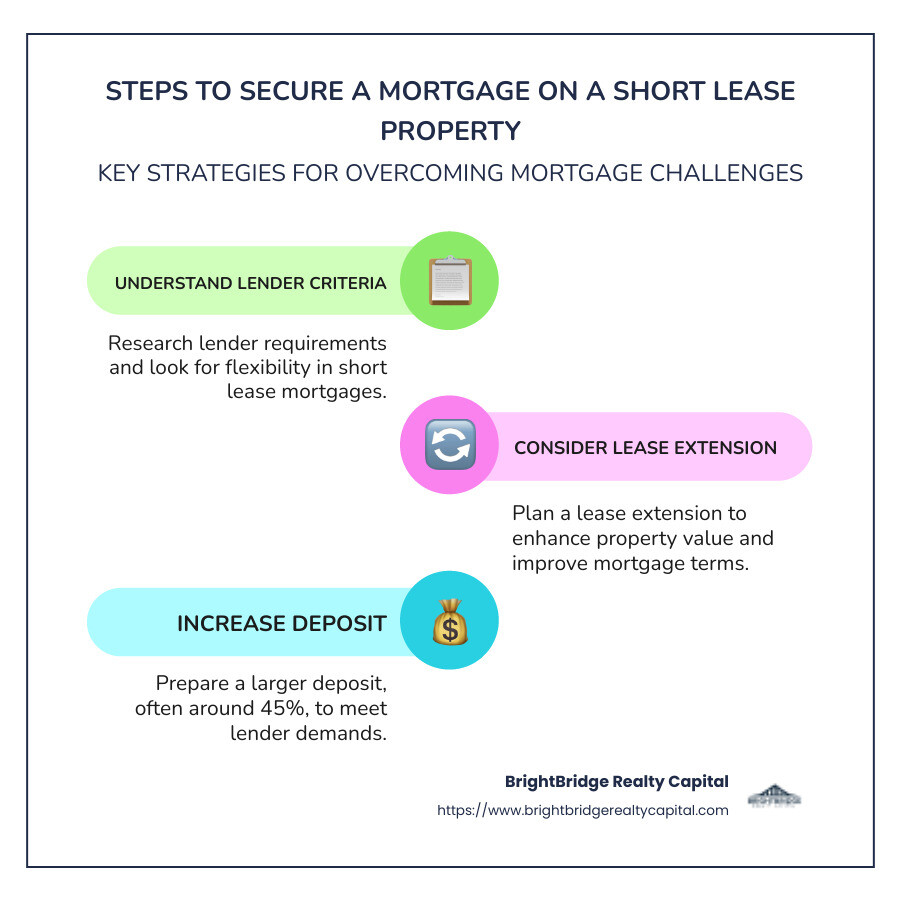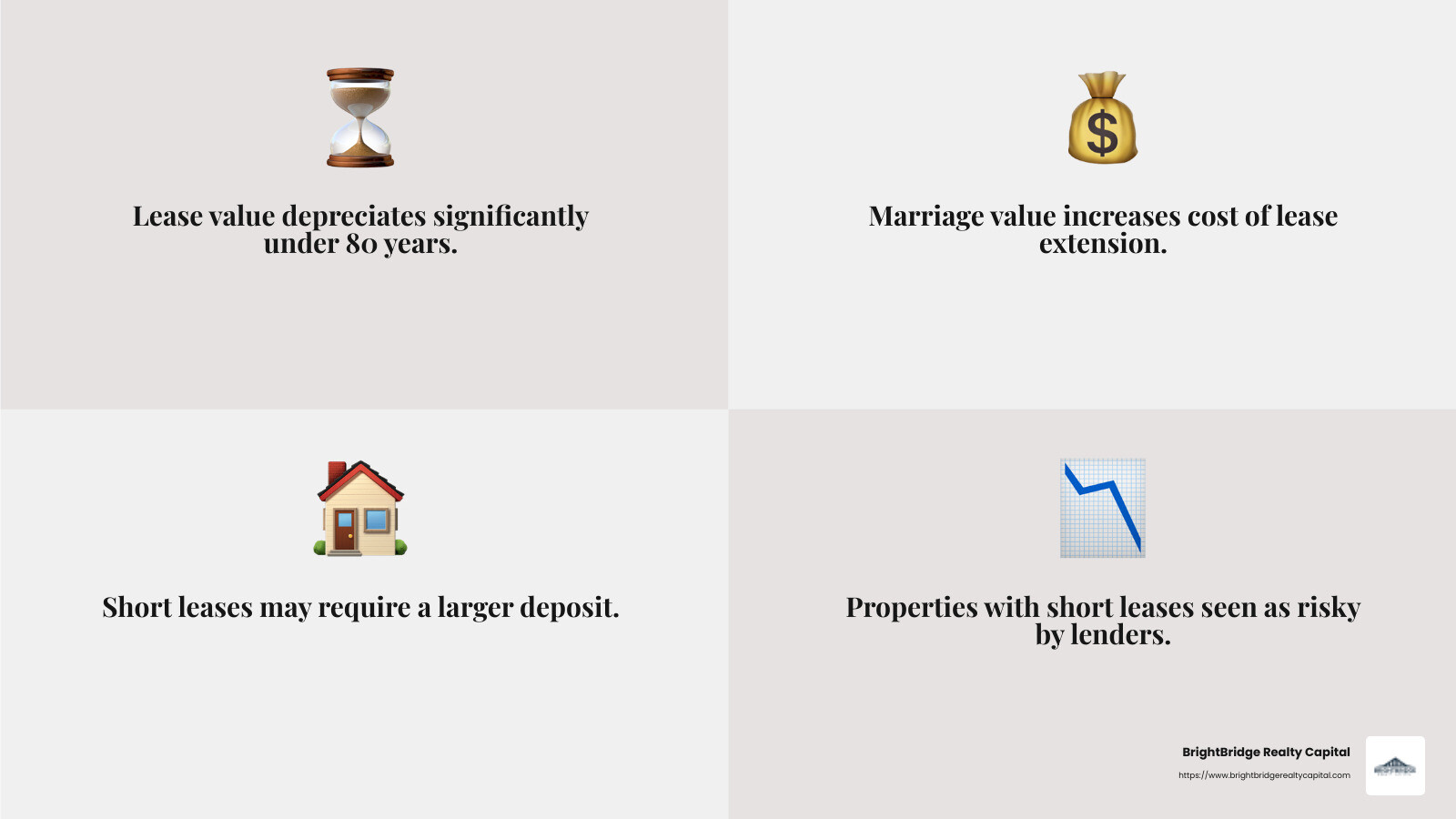The Short and Long of It: Understanding Mortgages for Short Lease Properties

Getting a mortgage on a short lease property can be challenging but not impossible. Here's a quick glance at what you need to know:
Short Lease Impact: Properties with less than 80 years on the lease can lead to decreased property values, affecting mortgage approval as lenders get cautious.
Lender Requirements: Short lease mortgages often demand stricter criteria, including a larger deposit, usually around 45%.
Lease Extensions: Extending the lease might improve property value and ease mortgage approval, but this process can be costly and time-consuming.
Navigating the complexities of short lease properties requires understanding certain key challenges in the mortgage landscape. A short lease means your property is leasehold, not freehold, which plays a significant role in ownership rights and financial implications.
A property with a dwindling lease term can create problems. Mortgage lenders perceive these as risky investments due to their potential drop in value and limited resale appeal. As years pass and the lease term shrinks, securing favorable mortgage conditions becomes more arduous. Understanding these challenges and two steps ahead—like planning for a lease extension—can ease the process.

Getting a mortgage on a short lease property vocab explained:
- buying a house to rent out mortgage
- home equity line of credit to buy rental property
- secured loan on buy to let property
Understanding Short Leases
Leasehold vs Freehold
When you buy a property, you can own it in one of two ways: leasehold or freehold.
Freehold: You own the property and the land it stands on outright. This is common with houses. You have full control, and your ownership is not limited by time.
Leasehold: You own the property but not the land. Instead, you have a lease agreement with the landowner, typically starting at 99 or 125 years. This is common with flats. Your rights are limited to the lease term.
Understanding the difference is crucial. With a leasehold, you may face additional costs and restrictions, especially as the lease term shortens.
Lease Depreciation
As the lease term decreases, so does the property's value. This depreciation can make it harder to sell or refinance. Lenders see properties with short leases as risky because:
- The property may lose value quickly.
- It might be difficult to resell.
When a lease drops below 80 years, it significantly impacts your ability to secure a mortgage. You may need a larger deposit or face higher interest rates.
Marriage Value
Once a lease has less than 80 years left, another factor comes into play: marriage value.
- What is it?: It's the increase in property value when a lease is extended.
- Why it matters: When extending a lease, the freeholder is entitled to half of the increase in property value. This makes extending a lease more expensive.

Understanding these elements—leasehold vs freehold, lease depreciation, and marriage value—helps you steer the challenges of getting a mortgage on a short lease property. Being aware of these factors can guide you in making informed decisions and planning effectively for the future.
Getting a Mortgage on a Short Lease Property
When you're considering getting a mortgage on a short lease property, understand the challenges and options available. Lenders view these properties as higher risk, which affects their lending criteria and the terms they offer.
Specialist Lenders for Short Leases
For properties with short leases, traditional lenders might be hesitant. That's where specialist lenders come in. These lenders offer bespoke products custom to the unique needs of short lease properties.
Bespoke Products: Specialist lenders create mortgage products specifically for short lease properties. They understand the complexities and are more flexible with their terms.
Flexible Terms: These lenders often provide more adaptable conditions, such as accepting lower lease lengths or offering creative financing solutions. However, this flexibility often comes at a cost, with higher interest rates or fees.
Impact of Lease Length on Mortgage Terms
The length of your lease significantly influences the mortgage terms you can secure.
Interest Rates: Short lease properties typically come with higher interest rates. Lenders charge more to offset the perceived risk of the property losing value quickly.
Fees: Additional fees might apply. These can include higher arrangement fees or valuation fees, reflecting the increased risk and complexity involved.
Deposit Requirements: Be prepared to put down a larger deposit. While a standard property might require a 10-20% deposit, short lease properties often need 30-40% or more. This reduces the lender's risk and increases your chances of securing a mortgage.
Loan-to-Value (LTV) Adjustments: Lenders might offer lower LTV ratios for short lease properties. Instead of the typical 80-90% LTV, you might only see 60-70%, meaning you need a larger deposit.
Understanding these factors can help you steer the complexities of securing a mortgage for a short lease property. With the right strategy and lender, you can find a path that suits your needs and financial situation.
Strategies for Securing a Mortgage
When it comes to getting a mortgage on a short lease property, there are several strategies you can employ to improve your chances. Let's explore a few key approaches: lease extensions, bridging loans, and increasing your deposit.
Lease Extension
One effective strategy is extending the lease. A longer lease can make the property more attractive to lenders and increase its market value.
Self-Initiated Lease Extension: After owning the property for two years, you can apply to extend the lease. This process can be expensive and lengthy, but it often pays off by turning a short lease into a standard full-term lease, making it easier to secure a mortgage.
Leasehold and Freehold Reform Act: This act aims to simplify and reduce the cost of lease extensions. While not fully in effect, it signals a move towards more accessible options for leaseholders.
Bridging Loans
Bridging loans are another option for financing short lease properties. These are short-term loans designed to bridge the gap until longer-term financing can be secured.
Quick Access to Funds: Bridging loans provide quick access to funds, which can be crucial if you're in a competitive market or need to act fast.
Higher Costs: Bridging loans often come with higher interest rates and fees. They're best used as a temporary solution while arranging for a more permanent mortgage.
Increased Deposit
Finally, increasing your deposit can significantly improve your mortgage prospects.
Lower LTV Ratios: Lenders are more likely to approve mortgages with lower loan-to-value ratios. By putting down a larger deposit, you reduce the lender's risk and improve your chances of approval.
Negotiating Power: A higher deposit not only increases your chances of securing a mortgage but also gives you more leverage to negotiate better terms, such as lower interest rates or reduced fees.
By employing these strategies, you can steer the challenges of securing a mortgage for a short lease property. Whether it's extending the lease, using a bridging loan, or increasing your deposit, each approach can help you achieve your property ownership goals.
Frequently Asked Questions about Short Lease Mortgages
Can you get a mortgage on a 60-year lease?
Yes, getting a mortgage on a short lease property with a 60-year lease is possible, but it comes with challenges. Many mortgage providers have strict criteria for short leases. Typically, lenders prefer leases with at least 70-80 years remaining. A 60-year lease often means fewer lender options and stricter requirements.
Lease Extension: To improve your chances, consider extending the lease. Extending the lease can make the property more attractive to lenders by increasing its value and lengthening the lease term.
Specialist Lenders: Some specialist lenders focus on short lease properties and offer custom mortgage products. These lenders may provide more flexible terms, but often at higher interest rates.
What is the minimum lease for a mortgage in the UK?
In the UK, most mainstream lenders require a minimum lease term of around 70 years at the start of the mortgage. This ensures the lease will cover the mortgage term plus a buffer, usually 30-40 years beyond the loan's end.
Lender Requirements: Each lender has its own criteria, and some may consider shorter leases, especially if you plan to extend the lease soon. However, expect stricter conditions, higher deposits, and possibly higher interest rates.
Property Value Impact: A lease below 70 years can significantly impact property value, making it harder to secure favorable mortgage terms. The shorter the lease, the more it affects the property's marketability and financing options.
Should I buy a flat with a 90-year lease?
Buying a flat with a 90-year lease is generally more straightforward. Most lenders consider this a safe bet, as it comfortably covers the mortgage term with a buffer.
Mortgage Options: With a 90-year lease, you have access to a wide range of mortgage products. This includes competitive interest rates and more favorable loan-to-value ratios.
Property Value: A 90-year lease is less likely to depreciate quickly, maintaining the property's value over time. It's also easier to sell in the future, as potential buyers won't face immediate lease extension concerns.
In summary, while shorter leases can limit your mortgage options, understanding lender criteria and considering lease extensions can help you steer the process. For those with a 90-year lease, the path to securing a mortgage is generally smoother, offering more flexibility and better terms.
Conclusion
Navigating getting a mortgage on a short lease property can be complex, but with the right guidance, it becomes manageable. At BrightBridge Realty Capital, we specialize in helping investors make informed decisions. Our team offers expert advice custom to your unique situation, ensuring you understand all your options.
Why Choose BrightBridge Realty Capital?
Expert Advice: Our team is well-versed in the intricacies of short lease mortgages. We provide clear, practical advice to help you make the best financial decisions.
Customized Solutions: We offer bespoke financing options designed to meet your specific needs. Whether it's extending a lease or securing a mortgage, we have the tools and expertise to assist you.
Fast Closings: We pride ourselves on our ability to close deals quickly, often within a week. Our direct lending approach eliminates intermediaries, ensuring a seamless and efficient process.
Nationwide Reach: No matter where your investment properties are located, our nationwide services ensure you have access to the capital you need.
When it comes to short lease properties, understanding your mortgage options is crucial. By partnering with BrightBridge Realty Capital, you gain access to expert guidance and innovative financing solutions that help you achieve your property investment goals.
For more information on our services and how we can assist you, visit our BrightBridge Realty Capital page. Let us help you bridge the gap with smart real estate financing.


